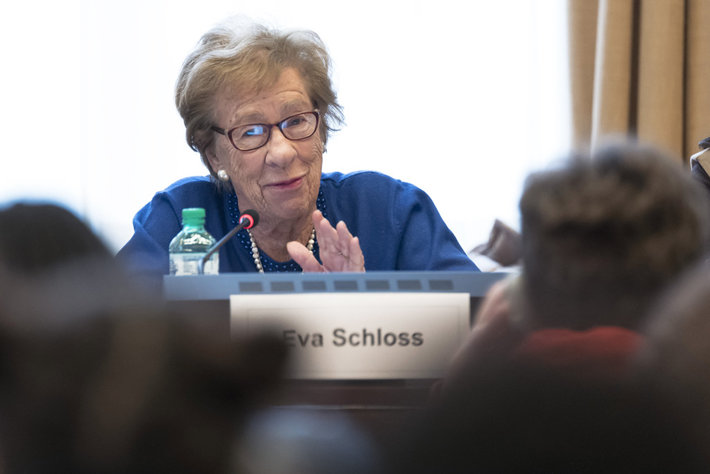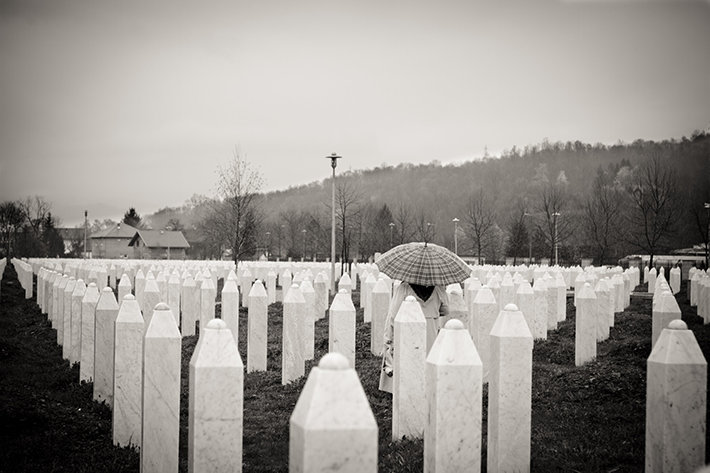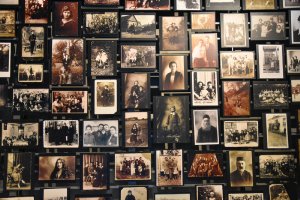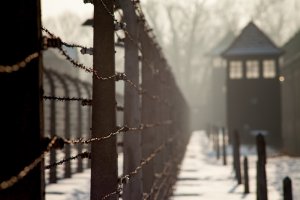At 91, Eva Schloss, stepsister of Anne Frank, is one of the world’s oldest Holocaust survivors.

A prisoner at the Auschwitz-Birkenau Nazi death camp at age 15, she has earned international renown as a lifelong campaigner against racism, anti-Semitism and other human cruelty and offers a unique perspective on the treatment of marginalized communities.
But like many other Jews who suffered Nazi atrocities, it took Schloss decades to overcome her trauma and start speaking about her nine-month imprisonment in the most notorious Nazi concentration camp, liberated by the Russian Red Army 76 years ago on January 27.
“I never spoke about my experiences until 40 years later—it was too difficult,” Schloss told a packed audience in 2018 at Oxford Union, a debating society whose members are mainly students at Oxford University. “I think I started to speak when I realized the world had not really learned anything—there’s still a lot of discrimination and we really have to change our ways.”
Schloss, who has written three books about her experiences as a Holocaust survivor, was born in 1921 in Vienna. Along with her mother, Elfriede Geiringer, and her father and older brother, she fled Austria when the Nazis invaded the country in 1938. The family took refuge in Belgium and eventually settled in Amsterdam, where they lived down the street from Anne Frank and her family.
“I think I started to speak when I realized the world had not really learned anything—there’s still a lot of discrimination and we really have to change our ways.”—Eva Schloss
The Frank family had left Frankfurt, Germany, in 1933, shortly after the Nazis walked through the city’s streets singing, “When Jewish blood drips from our daggers, then things will get better,” as Schloss put it in her Oxford speech, quoting Anne Frank’s father Otto who realized “this is not a country where I want to bring up a family.”
In May 1940, after her family had been in Amsterdam for just a few months, the Nazis occupied Holland. By 1942, when Schloss was 13, they began rounding up Jews and deporting them to death camps. In response, members of the Dutch resistance offered their homes to hide Jewish families in an effort to keep them safe. But because the homes were small, most Jewish families had no choice but to split up.
Schloss’s father explained that he would stay in one home with her brother, while she lived elsewhere with her mother. “If you are in two different places,” Schloss recalls him saying, “the chances that two of us will survive is bigger.”
“He mentioned ‘survive,’ and at 13, that was the first time I realized it might be a matter of life and death,” Schloss said. For the next two years, like her famiily, the Franks—Eva’s schoolmate Anne, and Anne’s sister, mother and father—went into hiding.
Schloss’s family changed homes seven times, partly because it became too dangerous for many Dutch people to continue hiding Jews. Eventually, a Dutch nurse, who turned out to be a double agent, informed the Nazis that Schloss’s father and brother were in her home. The nurse had betrayed some 200 Jewish people in this manner. “After the war, there was a court case against her,” according to Schloss, “and she got only four years.”
The Nazis arrested Schloss on May 11, 1944, her 15th birthday, along with the rest of her family. The Frank family was also arrested around the same time, and both families were packed into cattle trains and sent to Auschwitz-Birkenau in Poland. (Male inmates were imprisoned in the sprawling Auschwitz camp, while women were locked three miles away in Birkenau.)
As Schloss tells it, she and other prisoners were tattooed by Nazi guards who told them, “you are not human beings—you’re cattle who get a number … forget you have a name.” The youngest and most feeble of the inmates were regularly “selected” by Josef Mengele, a Nazi physician whose job it was “to decide who was going to die and who was going to live,” recalls Schloss.
The “selected” were then gassed, often under the guise of being taken to have showers. “Some were even given soap and a towel, and they stood there, but of course no water came but gas,” Schloss said. “Within 15 minutes, they were dead.”
Living conditions at the camp were cramped and terrible. Food consisted of “a little mug of liquid” for breakfast and a chunk of bread for dinner. There was no lunch. “Some people wanted to keep the bread for the morning,” Schloss recalls, “but you had nowhere to keep anything, so the only place was to put your head on it in the night” to keep it from being stolen by other hungry prisoners.
One day, Mengele selected Schloss’s mother for gassing, evidently because she was thin and sickly—she had been giving Schloss her piece of bread. It was only “through a miracle my mother was saved,” said Schloss.
“I still can’t understand why there is so much discrimination against people, especially for religious reasons. Religion is something beautiful, it’s personal, and we should let everybody worship whomever they want without danger of being killed or persecuted.”—Eva Schloss
The Nazis kept meticulous records about inmates at Auschwitz, which has since been turned into a museum. The details, which include prisoners’ numbers, physical conditions, statements and the location of their barracks, help relatives of the camp’s victims see for themselves the conditions in which they lived.
And still, said Schloss, “there are people who deny that this happened—when there is so much proof.”
After Auschwitz was liberated, Schloss learned from the Red Cross that her father and brother had perished in the forced march to the Mauthausen death camp in Austria. The Nazis, who fled Auschwitz days before the Red Army’s arrival, had forced Schloss’s father and brother to march with them, along with hundreds of other inmates.
Anne Frank, her sister Margot and her mother also perished. Otto Frank, Anne's father, survived. When he read Anne’s diary, he later wrote, “For me, it was a revelation. There, was revealed a completely different Anne to the child that I had lost. I had no idea of the depths of her thoughts and feelings."
Honoring his daughter’s wish to someday publish a book on her life in the secret annex in Amsterdam, Otto published her diary in 1947. It has since been translated into more than 70 languages. In her introduction to the diary's first American edition, Eleanor Roosevelt described it as "one of the wisest and most moving commentaries on war and its impact on human beings that I have ever read.”
In 1953, a year after Eva married Zvi Schloss, an Israeli scholar of economics she met in London, Otto Frank and Schloss’s mother Elfriede married and Schloss became Anne’s posthumous stepsister.
Last July, Schloss participated in the first-ever digital campaign by Holocaust survivors seeking an end to Holocaust denial posts on Facebook. Survivors from around the world recorded 30-second messages, calling on Facebook CEO Mark Zuckerberg to acknowledge that Holocaust denial is hate speech and to remove it from the platform.
On the 75th anniversary of the liberation of Auschwitz last year, Schloss was asked on the BBC show “Good Morning Britain” how she felt about “the rising tide of anti-Semitism” not just in the U.K. but around the world.
“I must say, I am not in the least bothered,” she replied. “We have been persecuted since ever. And it’s not just Jews who are discriminated. It’s the Muslims, it’s the Christians as well—just people who are not the same as you are. So I think the more fuss we make about it, the more attention we draw to it.”
Asked about her message of tolerance, Schloss responded that she “still can’t understand why there is so much discrimination against people, especially for religious reasons.”
“Religion is something beautiful,” she said, it’s personal, and we should let everybody worship whomever they want without danger of being killed or persecuted.”
_______________
The Church publishes this blog to help create a better understanding of the freedom of religion and belief and provide news on religious freedom and issues affecting this freedom around the world.
The Founder of the Scientology religion is L. Ron Hubbard and Mr. David Miscavige is the religion’s ecclesiastical leader.
For more information, visit the Scientology website or the Scientology TV network.


